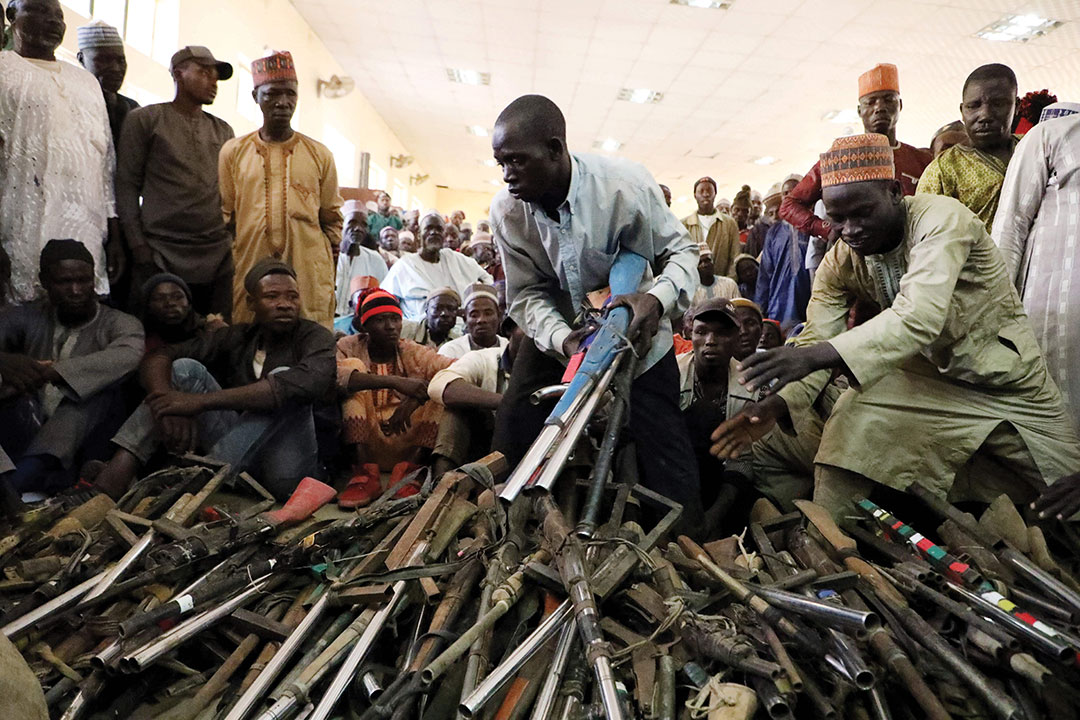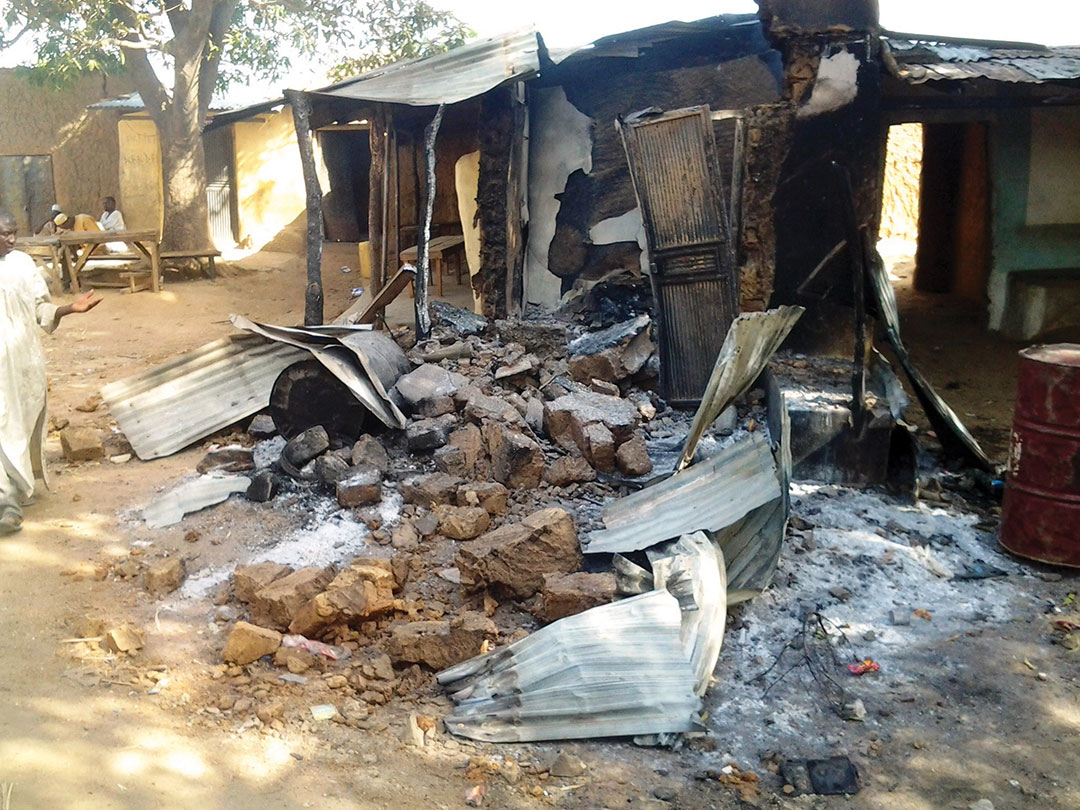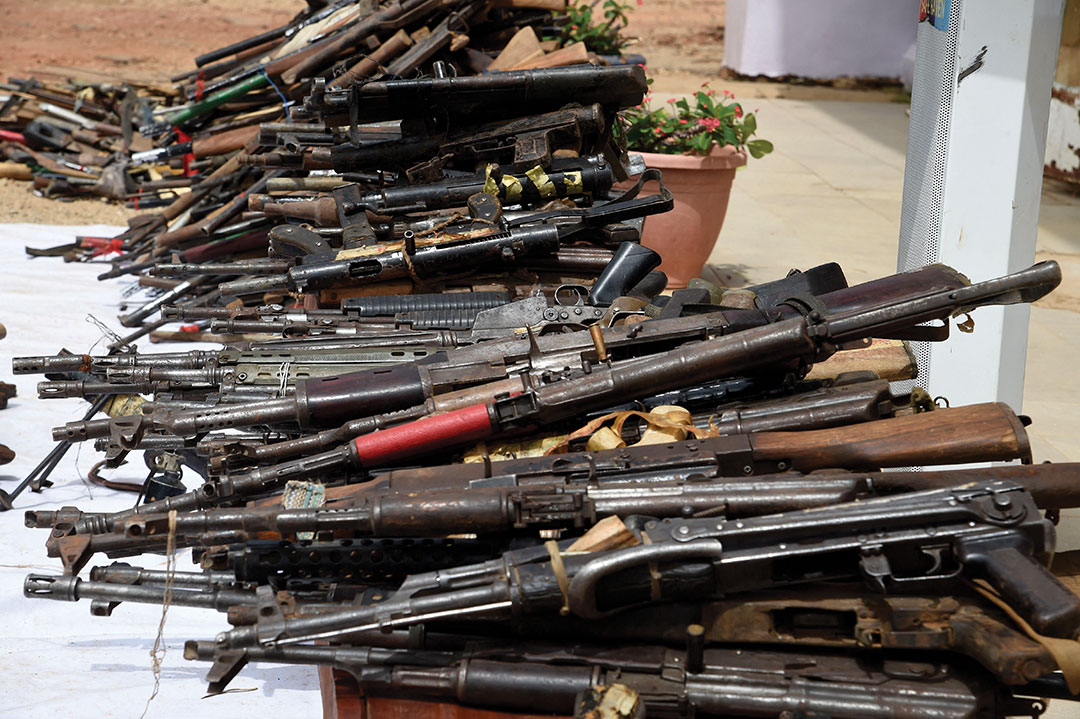ADF staff | photos by afp/getty images
When Interpol coordinated international raids under Operation Jackal, it targeted Black Axe, a Nigeria-based organized crime group. In the 2022 sweep, authorities arrested 75 people, searched 49 properties and intercepted bank accounts worth nearly $1.3 million.
Authorities also seized 12,000 cellphone SIM cards and identified 70 additional suspects. Investigators in 14 countries on six continents participated: Argentina, Australia, Côte d’Ivoire, France, Germany, Ireland, Italy, Malaysia, Nigeria, Spain, South Africa, the United Arab Emirates, the United Kingdom and the United States.
A few months later in May 2023, Interpol continued Operation Jackal in 21 nations to again strike at Black Axe and similar West African crime syndicates. This time, authorities blocked 208 bank accounts linked to online financial crimes, seized or froze nearly $2.3 million, and arrested 103 people. Operations in Belgium, Brazil, Canada, Indonesia, Malaysia, the Netherlands, Portugal and Switzerland were added to the original countries.
“Illicit financial funds are the lifeblood of transnational organized crime, and we have witnessed how groups like Black Axe will channel money gained from online financial scams into other crime areas, such as drugs and human trafficking,” said Stephen Kavanagh, Interpol’s executive director of police services. “These groups demand a global response.”
At least one African security expert agrees, but he says success will be hard-won because many nations are not even aware that such groups are operating in their countries, and if so, how.
“You need a clear-cut strategy, a comprehensive strategy,” said Martin Ewi, technical coordinator of the Enhancing Africa’s Response to Transnational Organised Crime project, known as ENACT, at the Institute for Security Studies. “It’s not one strategy. … No, it has to be a comprehensive strategy where you tackle them from all over. It’s a human institution. Human institutions do not survive on one thing.”
The nature of Black Axe and other similar groups makes coordination a tall order for most nations. Yet failure to address this organized criminal threat can imperil security locally, nationally and internationally, Ewi said.

WHAT IS BLACK AXE?
Black Axe’s origins are unique for a criminal organization. It formed with good intentions on July 7, 1977, on the University of Benin campus in Nigeria’s Edo State. It began as a part of the Neo-Black Movement, an effort to promote anti-colonialism and pan-African spirit, according to a 2019 Harper’s magazine profile.
The organization is one of many so-called confraternities that formed at the time. Sometimes the groups are referred to as cults because of the mystery that surrounds their activities and rituals. Other prominent groups are the Supreme Eiye Confraternity, which is popularly known as the Airlords; and Maphite, an organized crime group that authorities say is an acronym for “Maximum Academic Performance Highly Intellectuals Train Executioner.” Each has its roots in Nigeria.
There also are smaller, local criminal gangs, particularly in South Africa, where Ewi is based. They sport flashy names such as the Americans, the Hard Livings, Young Dixie Boys, Clever Kids, Naughty Boys and the Junky Funky Kids. They are most prominent in larger cities such as Cape Town, Durban, Johannesburg and Pretoria. Hundreds of similar gangs are spread across Nigeria.
Black Axe, however, is among the largest, most notorious and widespread. Some reports suggest worldwide membership as high as 30,000 or more. A BBC report indicated that Black Axe is so prevalent in Benin City that some civilians there have formed armed militias for protection.
The group is known worldwide for pioneering advance fee scams, also known as “419 fraud” for the corresponding section of the Nigerian Criminal Code. In such a scam, an operative will send out letters, faxes or emails posing as a legal, government or bank official seeking help in moving money into a foreign account. The sender promises to offer the victim a commission in exchange for payments to cover transfer fees or access to bank account numbers.

INSECURITY AT HOME
Transnational organized crime groups can victimize people anywhere in the world through elaborate internet financial scams, human trafficking and drug smuggling. In that way, groups such as Black Axe pose clear-cut security threats.
But less focus is placed on how such groups can endanger security in their home nations and regions. Ewi said this phenomenon is one that poses especially vexing problems because of the lack of knowledge and study that has been done of such groups.
First of all, the groups’ origins as philanthropic groups aimed at supporting the Black power movement and combating racism provide a veneer or respectability. Also, some of the groups have criminal and noncriminal elements. “This is a key aspect of why the Black Axe movement has been able to go global the way it has gone,” Ewi said.
“Now, why did they become so popular also? Today with the hardship that many young people are facing, the huge unemployment in Africa, the fact that many young people cannot find jobs, groups like these are very, very appealing,” Ewi said. “And if you can get good membership, you can get some good organization. You are able to attract many of these young people, and the Black Axe movement, the groups such as the Maphite, groups such as the Airlords — all of them have capitalized on that.”
These dynamics are similar to those that play into recruitment for violent extremist organizations such as Boko Haram and al-Shabaab. Young people without job prospects or educational opportunities find that they can earn money and status by picking up weapons and fighting for such groups. The same is true with local and transnational gangs.
This can degrade state security in a number of ways. On the lowest level, local gangs such as those in South Africa perpetrate violence and petty crime, endangering locals and challenging law enforcement. In addition to petty street crimes and violence, larger, better-organized crime groups with more money can sway the government through political influence, bribery and other lawlessness. Black Axe has been reputed to have connections and influence in Nigerian politics.
“If more of these groups continue to grow, they pose a serious threat to the home country because they are so rich that they can buy off anyone in the home country, and the home country becomes a safe haven,” Ewi said. “If, for example, they face serious challenges abroad, they always come back home. So, their growth is a serious threat to the stability, the peace and cohesiveness of their home countries. And this is what we are seeing.”

THE THREAT OF EXTREMIST TIES
One potential security threat posed by Black Axe and other organized crime gangs is the possibility of cooperation with violent extremist groups such as Boko Haram and its regional offshoots. The problem is that there is little to no information about whether, how or to what extent such cooperation might exist.
“There is very little information about the organization from academic sources, supporting the suggestion that the Nigerian criminal organization has not been studied, adding to the group’s reputation of secrecy,” wrote South African writer Candice Boyers for the website Chosen Narrative in 2023.
Ewi agrees. Research on the possibility of such connections is not just scant, it’s “nonexistent,” he said. It’s reasonable to consider that extremist groups such as Boko Haram would seek to link up in some way with a well-connected transnational crime group such as Black Axe, he said, pointing to some reports of cooperation between Boko Haram and bandits in northern Nigeria.
In the January 2022 article “Northwestern Nigeria: A Jihadization of Banditry, or a ‘Banditization’ of Jihad?” authors James Barnett, Murtala Ahmed Rufa’i and Abdulaziz Abdulaziz confirm that there have been some connections between Nigerian extremists in the northeast and bandits in the northwest, mainly in Zamfara State.
Connections, they write, typically take three forms: coexistence, cooperation and convergence. The article notes that Boko Haram militants have “coexisted and intermittently cooperated with bandits in the northwest, with cooperation being limited to short-term, mutually beneficial exchanges of material or skills.” Convergence, however, in which each group increasingly engages in the behaviors of the other, has not been seen. Unlike Black Axe, northwest Nigeria’s bandits are rural gangs prone to kidnapping for ransom, cattle rustling, local extortion rackets and looting, the authors wrote.
So, could an organization such as Black Axe find common cause with a terrorist group such as Boko Haram? Ewi thinks it is possible. He also said there are mutual benefits for both sides to cooperate. For example, an extremist group could tap into an organized crime group’s multinational network to move or procure weapons for itself or traffic other contraband for profit. Conversely, a crime group could benefit from terrorists’ payments for services rendered.
ADDRESSING THE LAWLESSNESS
Nigerian authorities have gone after confraternity criminals at the local level on numerous occasions. In July 2021, Delta State Police Command arrested several Black Axe members and confiscated two pistols, a battle ax, a cutlass, ammunition, two laptops, six cellphones and a stolen car, according to Nigerian news blog SouthernVoice.
In September 2023, police in Ekiti State arrested 17 people on crimes including “cultism, murder, and kidnapping,” according to the Nigerian Tribune. The suspects confessed to being members of the Airlords. But such efforts might not be enough.
As groups such as Black Axe grow and test security efforts at home and abroad, their global ubiquity will make a one-dimensional effort fruitless, Ewi said. Nations will have to cooperate and share intelligence to strike at them globally.
“You don’t defeat them by fighting them in one country,” he said. “It doesn’t work. As long as they exist in one or two other countries, they will stay, replicate these cells and make them very, very difficult to defeat. So, it has to be, in my view, a global movement.”

